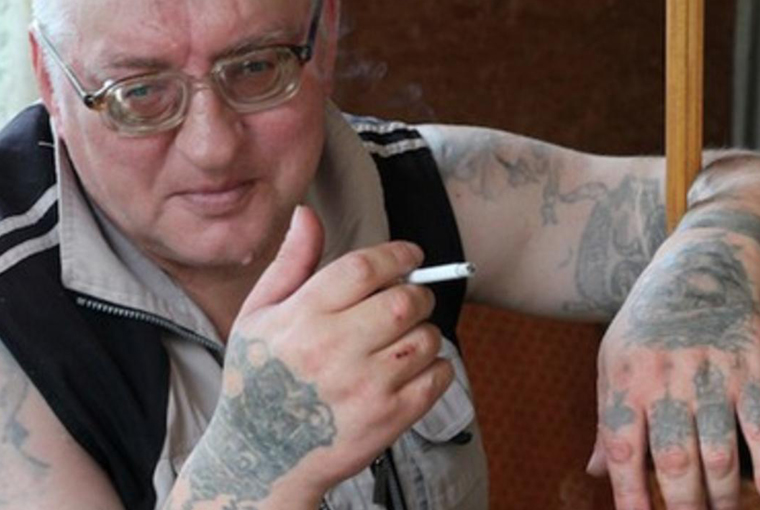Can You Hear Me?
Ričardas Marcinkus’ Final Destination (Galutinis tikslas, 2013)
Vol. 62 (February 2016) by Konstanty Kuzma
In the opening sequence of his debut documentary Final Destination, Ričardas Marcinkus revisits the place where his kindergarten once stood, a low, inconspicuous building that has since become a nursing home. If Marcinkus’ introductory voice-over resists making a direct parallel between kindergarten and nursing home, the anarchy he shall go on to document in the latter speaks for itself. We find patients arguing and brawling over the meowing of each other’s cats, an alcoholic peeing himself, and two friends secretly drinking beer together. Subtract the drugs and brutality and the connection will start to make sense. Having said that, Povilas Marcinkus, the protagonist of Marcinkus’ film whom he will go onto follow beyond the confines of the nursing home, is well accustomed with both drugs and violence and would thus fit less neatly into a kindergarten than many of his cohabitants. Having served half his life in prison, he’s more like the high school bully who’s busy asserting himself against everyone else. In an early scene, he sits topless in his room and tells Marcinkus about life in the nursing house while he plays with a jackknife, briefly pausing to shout at a neighbor. The only ones exempt from his rough ways are his cats, mice and other animals, as well as a toothless friend with whom he flips through porn magazines.
Of course, Povilas neither invented his machismos, nor is he the only one enforcing them. Though some patients at the nursing home seem most interested in drinking, violence appears to be omnipresent, sparing only those who are strong or at least as canny as Povilas, who, one-legged and somewhat overweight, is able to assert himself through intimidation rather than through brute force. In a disturbing scene at the nursing home, he steps into a neighbor’s room who’s had too much to drink and accuses the drunkard of having assaulted him. The neighbor can’t recall a thing while Povilas claims that he’s posing, leaving the viewer at loss. The antipathy between the two is the only thing we can be sure of. Perhaps, Marcinkus exaggerates the hostile atmosphere at the nursing home somewhat by not zoning in on any employees, but given that protagonist Povilas is an ex-convict who spent much of his life behind bars, this is probably intended to give us a rough idea of where Povilas is coming from. It doesn’t really come as a surprise, then, that Povilas must eventually leave the nursing home, though Marcinkus cleverly keeps us in the dark about the concrete reasons for his expulsion. This allows the viewer to try and rethink his image of Povilas, who’s suddenly catapulted into a life outside of state structures.
Surprisingly, Povilas seems happily accustomed to street life when Marcinkus picks him up again. Having met Snezhana, the “love of his life”, he suddenly appears tender and passionate. He smiles smugly as Snezhana wipes his face. “Look how she cares for me”, Povilas points out, resembling a young lover who’s just been introduced into the wonders of life. But this gleam of hope quickly disperses as Snezhana and Povilas seek out a quiet place to shoot up heroin. The price of having escaped the nursing home – a “second prison”, as Povilas calls it – is addiction, which Povilas describes by way of an analogy with a thirsty man who has nothing to drink.
Povilas, who only recently bullied his way through life at the nursing home, now earns his life begging. He complains, first to Snezhana, then to Marcinkus, how the begging and heroin wear him down, how he can’t take it anymore, and how he wants it all to end. Instead of posturing as a local thug who cares for nobody but his pets, Povilas now uses the camera to channel his worries. “Maybe I’ll get more money if the camera’s around,” he wonders, proving well-aware of its manipulative powers. This discernment is brought out in another scene in which we attend Povilas’ begging. Asked by Marcinkus whether children are among his benefactors, Povilas nods in agreement. “Children and old women are the most generous,” he reveals. “So you take children’s money to buy drugs?”, Marcinkus asks. “I never take money from children!”, Povilas exclaims, visibly irritated by Povilas’ furtive inquiry. “Asking me such a thing for your tape,” he says to himself, angry at being outsmarted by Marcinkus.
However much he swears at him, “Ričard” is also a friend whom he can turn to in times of need. When Povilas appears one day with a blood-ridden leg, he has no choice but to ask the director for help. “Lend me some money, Ričard, just this one time,” he begs with tearful eyes as the camera scans his brutal injury. Marcinkus hesitantly agrees, only to see Povilas and Snezhana spend the money on heroin rather than on the medicine he said he needs. Later, an ex-addict must similarly concede that it’s almost impossible for Marcinkus to let himself be helped. Time and again, thirst turns out to be stronger than reason. Can Marcinkus intervene? Did he?
It’s Marcinkus’ ability and willingness to expose the precarious position of the filmmaker that make Final Destination rarely undogmatic. Though Povilas’ story is immediately immersive, as are the mildly anarchistic, if gritty opening scenes in the nursing house, the constant struggle of introducing the filmmaker and his camera as a second (and third) protagonist adds piquancy to an already pressing subject. It is with great contempt that we learn that both Povilas and some of his former cohabitants at the nursing house in fact seem to be spurred, rather than restrained, by the camera to inflict psychological and physical damage on their peers, and that everyone, including the director, seems to exploit its presence, be it for bumming cigarettes and money, or for capturing a particularly provocative sequence, as that of a drunk cohabitant being senselessly beaten by another. Inevitably, this leaves us alienated from both the director and his subjects, though Marcinkus is smart enough not to present this detachment as a relativist message about how everyone is trapped in his own world. The final scene, in which Povilas whines at the misery of his fate, is in fact a living reminder that everyone seeks to be understood. Having lost both Snezhana and his pets and struggling to predominate the voice of a cohabitant who keeps telling him that it is all his fault, Povilas finally turns towards Marcinkus and the audience, the only ones left who can help him achieve the most that he can hope for – to be heard.




Leave a Comment